![]()
Capture the Atlas revealed the winners of its annual Northern Lights Photographer of the Year competition, showcasing the year’s best aurora borealis or australis photos.
Capture the Atlas is a popular travel and photography blog that offers resources to help photographers capture better photos, primarily landscape and astrophotography shots.
“There aren’t many events as moving as seeing the Aurora Borealis paint the sky with hues of green and violet. Under this awe-inspiring phenomenon, each location becomes magical when the Aurora shines across the night sky,” writes Capture the Atlas.
In this year’s Northern Lights Photographer of the Year, the blog’s sixth edition of the contest, Capture the Atlas has selected the 25 best northern lights photos, ranging from remote boreal forests in the Arctic to the stunning southern landscapes of Australia and New Zealand.
Below are 10 selected photos alongside descriptions written by the photographers. The entire 25-photo collection is available on Capture the Atlas, including EXIF information that may help budding astrophotographers dial in their settings. The solar cycle is active now, meaning that auroral displays are becoming frequent.
‘Storm Over Sukakpak’ by Nickolas Warner
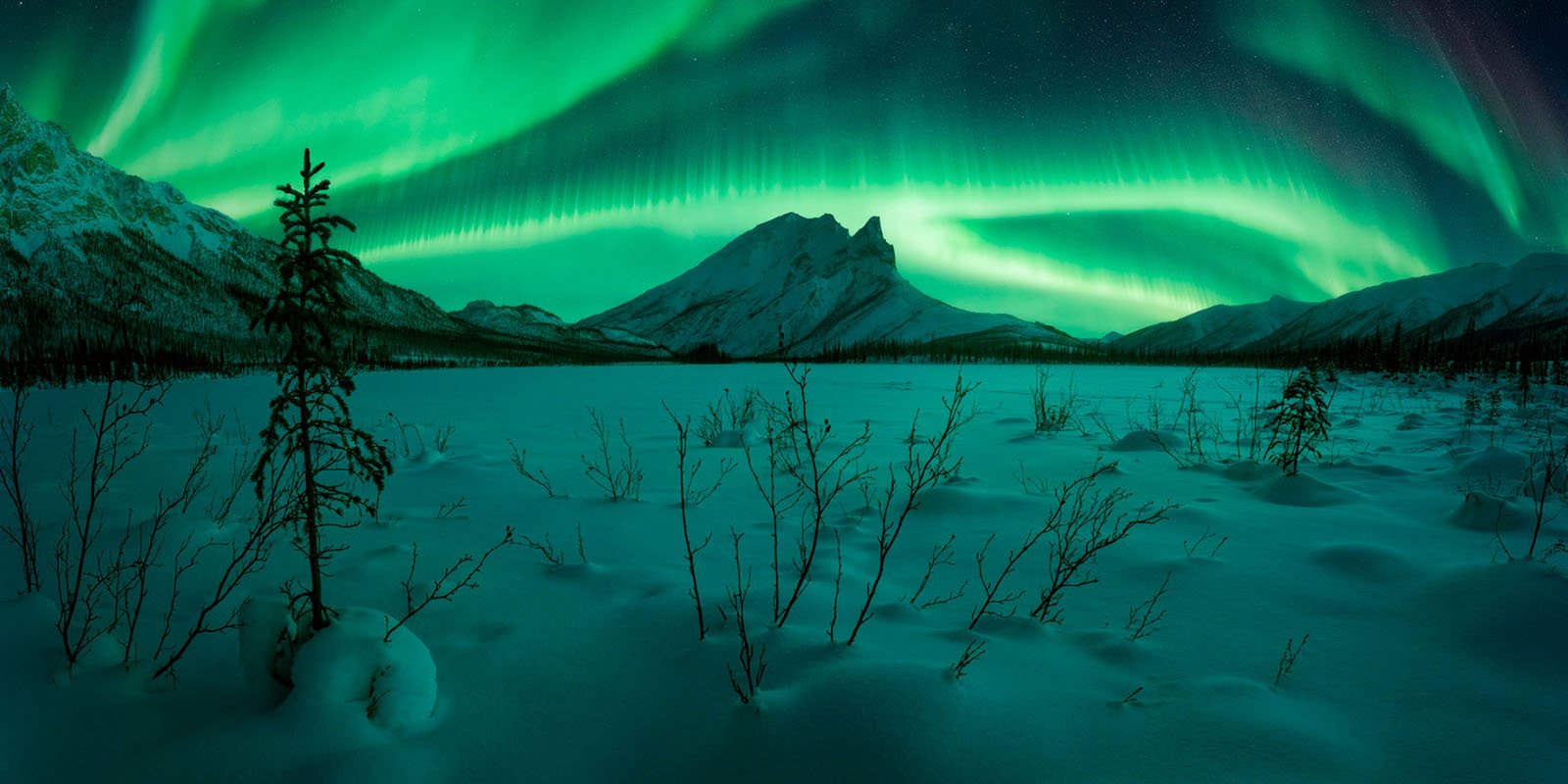
Located approximately 70 miles North of the Arctic Circle, Sukakpak Mountain is one of the most beautiful peaks in the Brooks Mountain Range. While I have photographed the Northern Lights in this area on numerous occasions, the most photogenic angle typically faces south, making it a bit challenging for auroras to align with the mountain.
That night, there was an expectation of an X-Class flare hitting, so I knew we needed to head somewhere great. We took our chances and decided to drive an hour north from our accommodation to capture Sukakpak Mountain in all its glory.
It’s very tempting to pull over and shoot where you are standing when the aurora is blazing above your head. When we got there, the sky exploded with more energy than I’ve seen in more than a decade of photographing the Aurora. Attempts to capture Northern Lights that intense resulted in a blurry mess. Instead, we ignored the cameras and stared up in awe as to not miss the light show.
It was only once things slowed down that I captured this panorama.
‘The Arctic Dance’ by Vincent Beudez
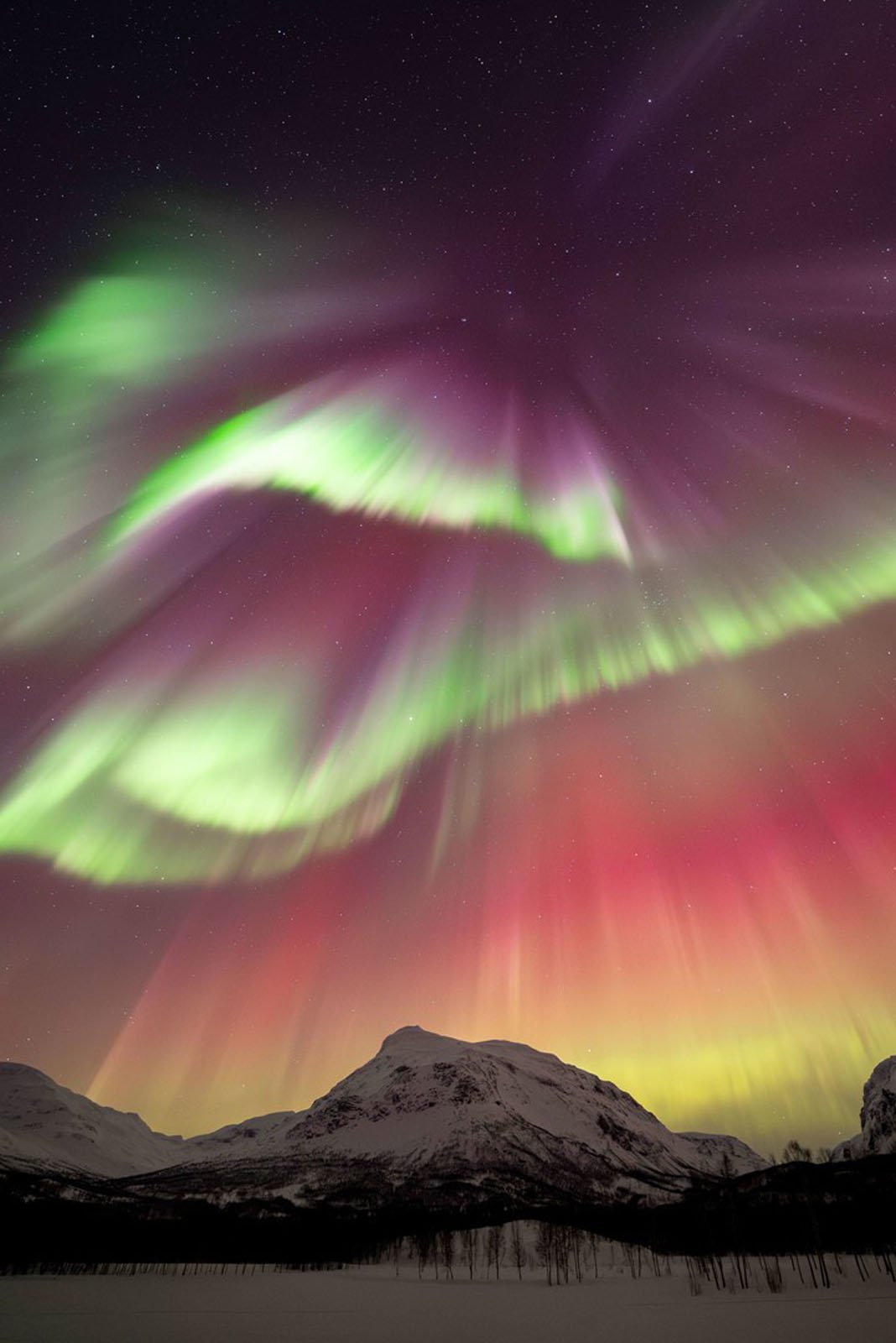
As Northern Lights photographers, this is the moment we live for, the strongest solar storm of the year. That particular night, the Northern Lights were so strong that they were even visible from France, my home country.
At that time, I was in Northern Norway, which meant I could see an incredible show even facing south. I was able to see the most colorful Northern Lights I’ve ever witnessed. Being a night photographer as well, I’m not only looking for the Northern Lights, but I chase shapes within a perfect environment, to create the perfect composition.
It’s hard to put into words the feeling when I saw this red curtain surrounded by dancing lights.
Lost Who I want to Be’ by Jordan McInally
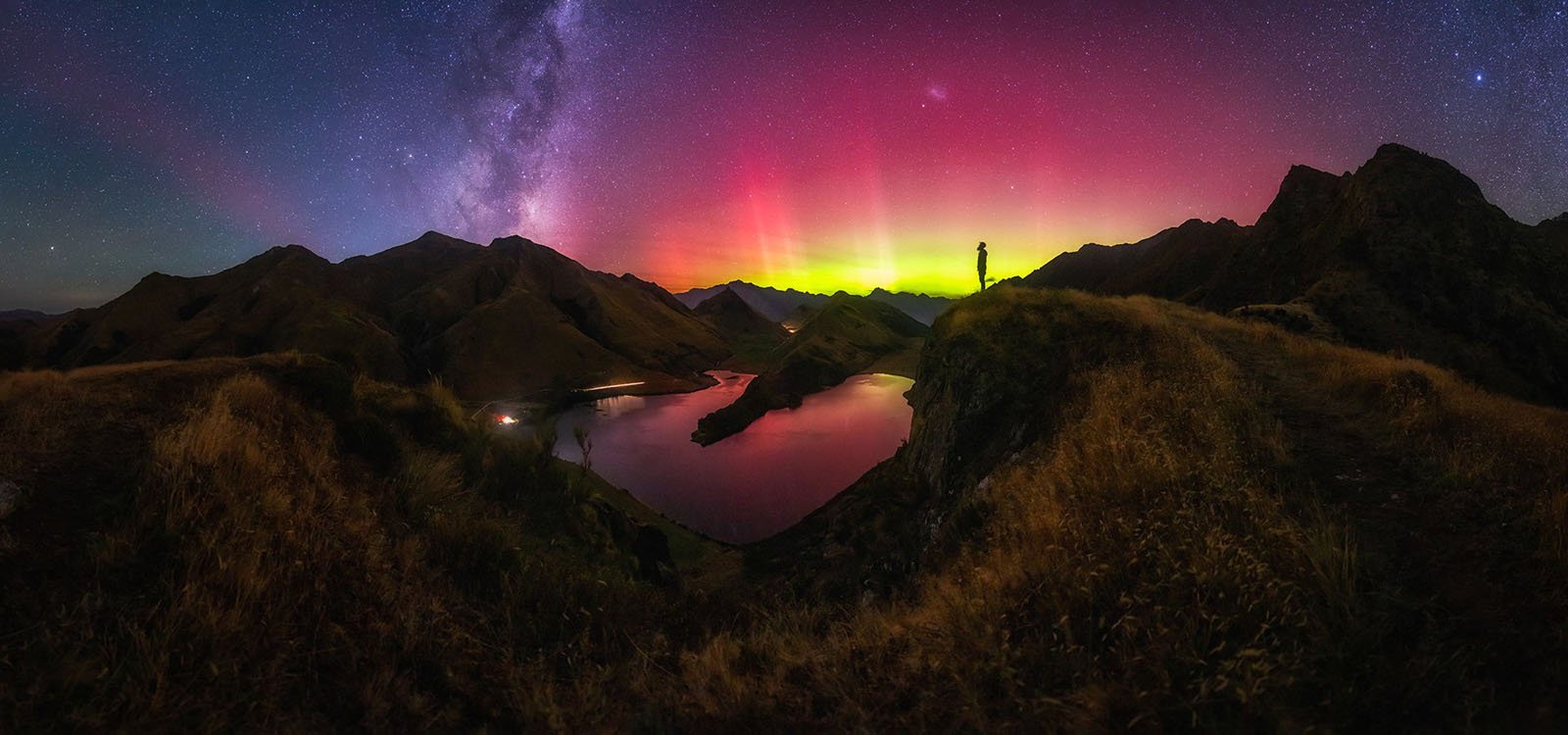
I was pretty lucky this night to have a few friends message me a heads up that a big Aurora Australis was forecast, so I had just enough time to rush to this local spot with a painfully steep ascent, watching beams start to dance across the horizon as the sunlight was fading!
I spent around five hours up here and had this whole ridge to myself, shooting over 300 frames of all manner of beams and colors as the show was constantly changing!
‘Goleuadau’r Gogledd’ by Mathew Browne
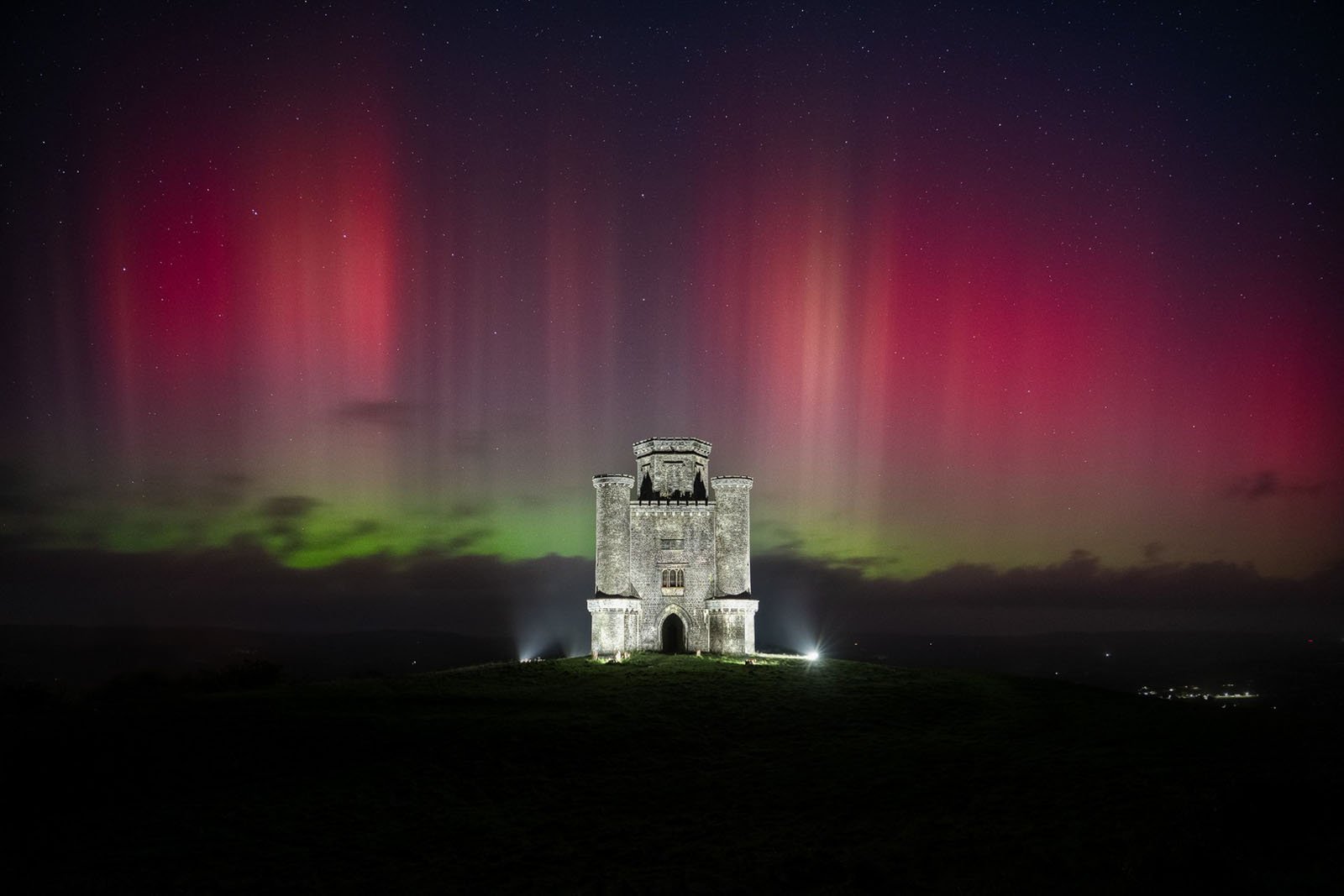
The title of this image, “Goleuadau’r Gogledd,” translates to ‘Northern Lights’ in Welsh. Finding the accurate translation proved challenging, as this phrase isn’t commonly used in everyday conversations here in South Wales.
The title of this image, “Goleuadau’r Gogledd,” translates to ‘Northern Lights’ in Welsh. Finding the accurate translation proved challenging, as this phrase isn’t commonly used in everyday conversations here in South Wales.
For over an hour, the horizon beyond the clouds emitted hues of green and pink. However, for a brief yet magical moment, the sky came alive with impressive pink pillars, visible to the naked eye.
‘Waning Sun’ by Alex Wides
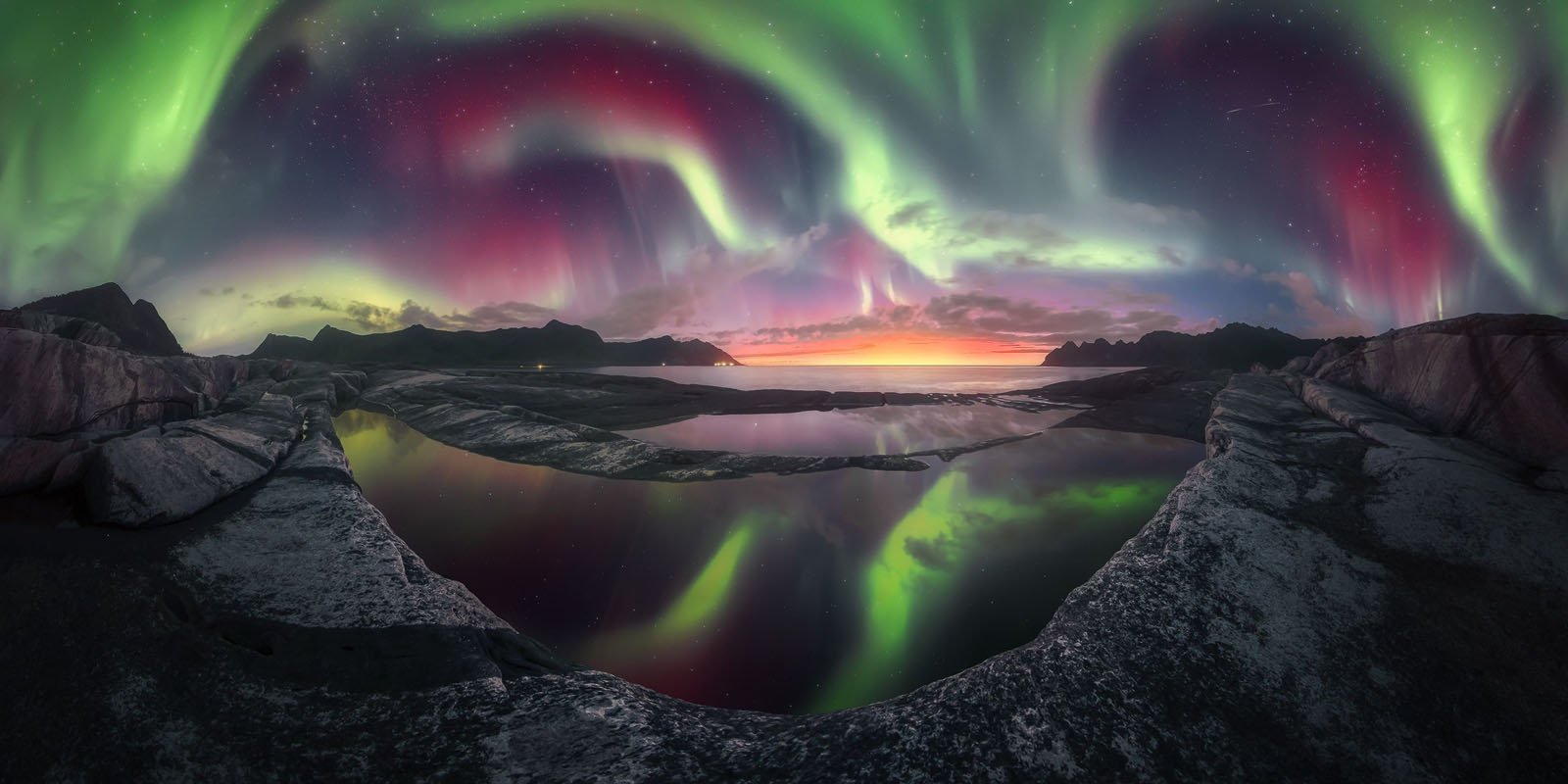
A 300-degree panorama captured on Senja Island (Norway) featuring the setting sun and an intense Kp seven Northern Lights display.
Embarking on a three-month journey from Italy to the Great North, you anticipate witnessing incredible sights, but this trip surpassed all my expectations. Arriving at Senja Island, my personal favorite among the places I’ve been fortunate enough to visit, we encountered the most powerful Northern Lights of the year, exactly as predicted.
The horizon is glowing with the light of the setting sun; in September, it sets at 11 PM, painting the sky in vibrant shades of green, purple, and red. This shot encapsulates the essence of the journey, capturing the beauty of an extraordinary adventure on one unforgettable evening with my family and two dogs, witnessing an awe-inspiring spectacle.
‘Lady in Pink’ by Kenneth Lerose
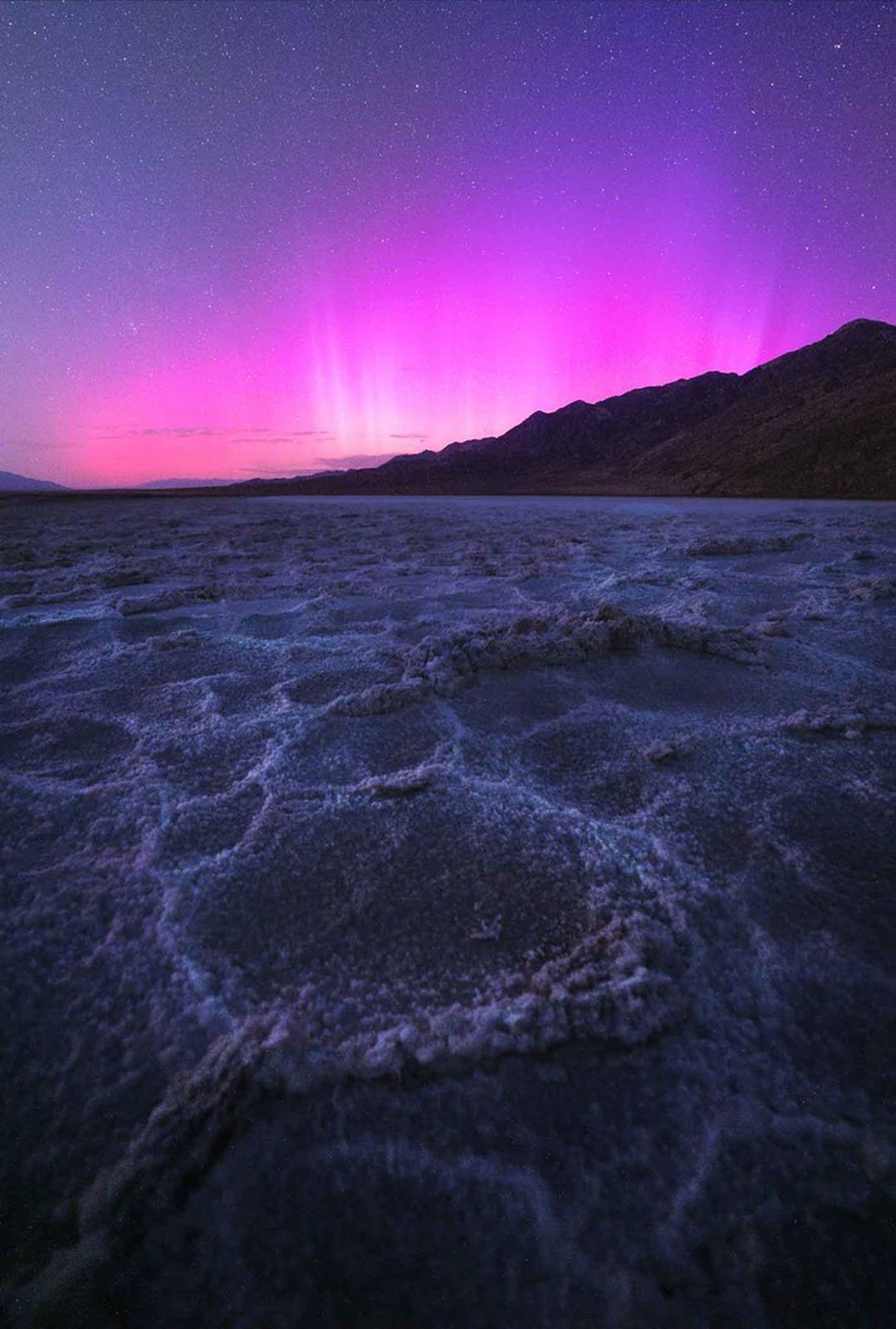
I really didn’t believe I’d see the aurora at the lowest altitude point in the US. When I saw the aurora forecast, I was in Vegas. The decision to drive to Badwater Basin was a last-minute one.
When I arrived, I started to second-guess myself once I saw all the atmospheric particles sinking into the basin. I kept thinking about changing locations because it wasn’t looking promising.
I parked just before blue hour and gathered a tripod and camera. I didn’t even take my camera bag out. I thought there would be no need to carry my second camera and tripod, but as I got halfway to my destination, I started seeing some faint lights in the sky. I couldn’t believe my eyes. I stopped and took a test shot and there it was! Pink pillars in the sky! I started running to find a composition to set up a timelapse. I ran back to my airstream a mile behind me to get the rest of my gear. I started snapping stills and set up another timelapse. This was my favorite still frame taken from this memorable night.
In true fashion, I write poems for each image I publish on socials. Here’s the poem I wrote for this one:
Drenched with ambition.
Flowing desire.
Lady in pink.
Internalized fire.Against all the odds.
She carries my light.
When I’m down for the count.
She reminds me to fight.She lessens the blows.
Her beauty’s unmatched.
She’s fire to the night.
She’s the spark to my match.
‘Gatklettur Northen Lights’ by Stefano Pellegrini
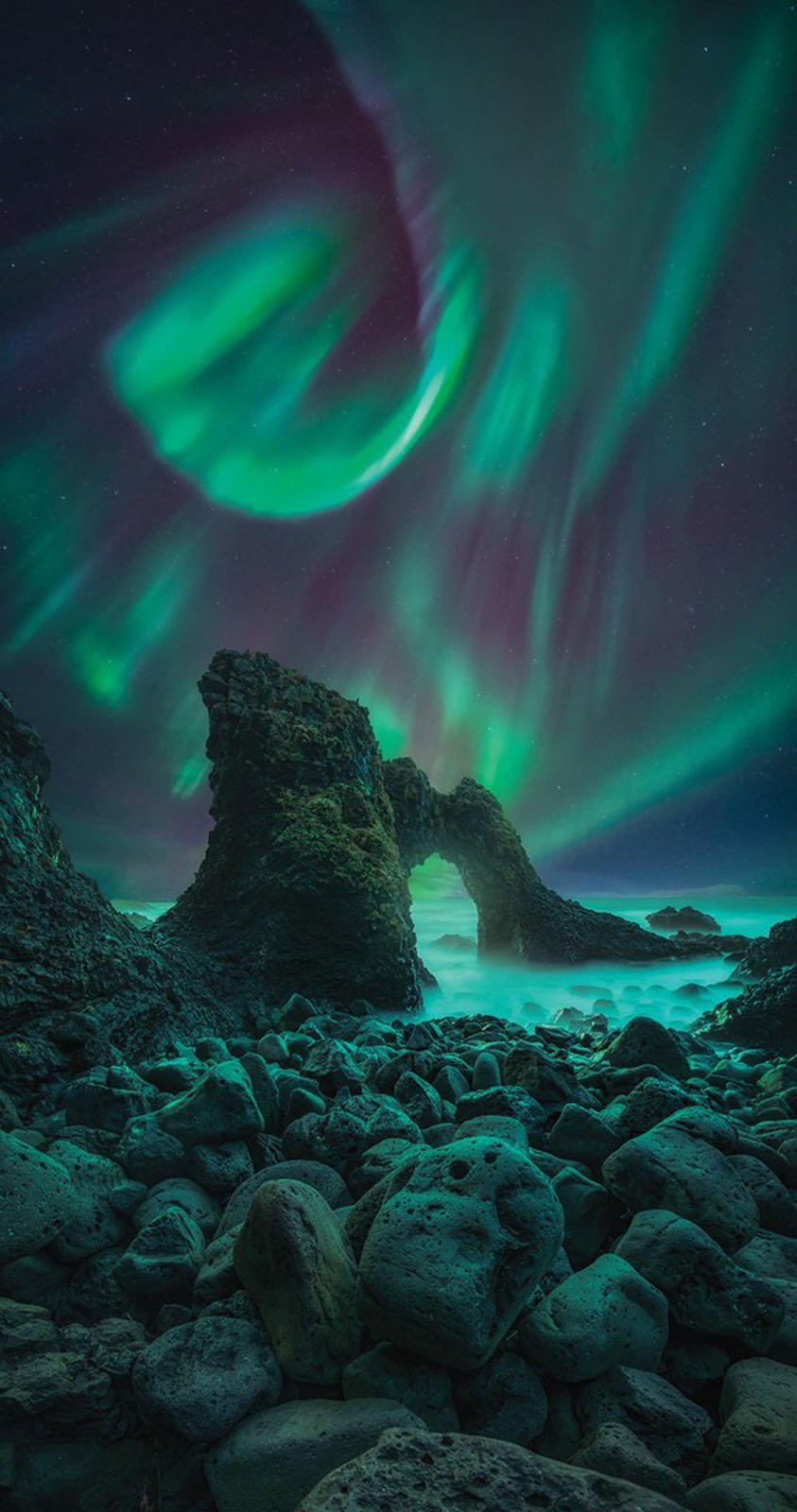
I spent a week in Iceland, chasing the Northern Lights. Opting for total freedom of movement to track clear skies each night, I lived in a car, planning my itinerary day by day instead of booking hotels in advance. The strategy paid off, and I captured the aurora on four out of seven nights. This photo is from the first night.
Arriving at the location after dark, I parked the car and prepared my sleeping bag. Despite being up since 4 AM, I set my alarm clock to wake me every hour in anticipation of a Kp five forecast for the night. I woke up at 2:30 AM on my own and spotted green hues from the car window. I hurried out, shooting frantically to seize the opportunity.
The final image is my second attempt. Initially, I framed the arch from the front down on the rocky shore but I wasn’t satisfied with the result. After a night of running around various locations, at 5 AM in the morning, I returned to the beach for another composition.
‘Green Snakes’ by Filip Hrebenda
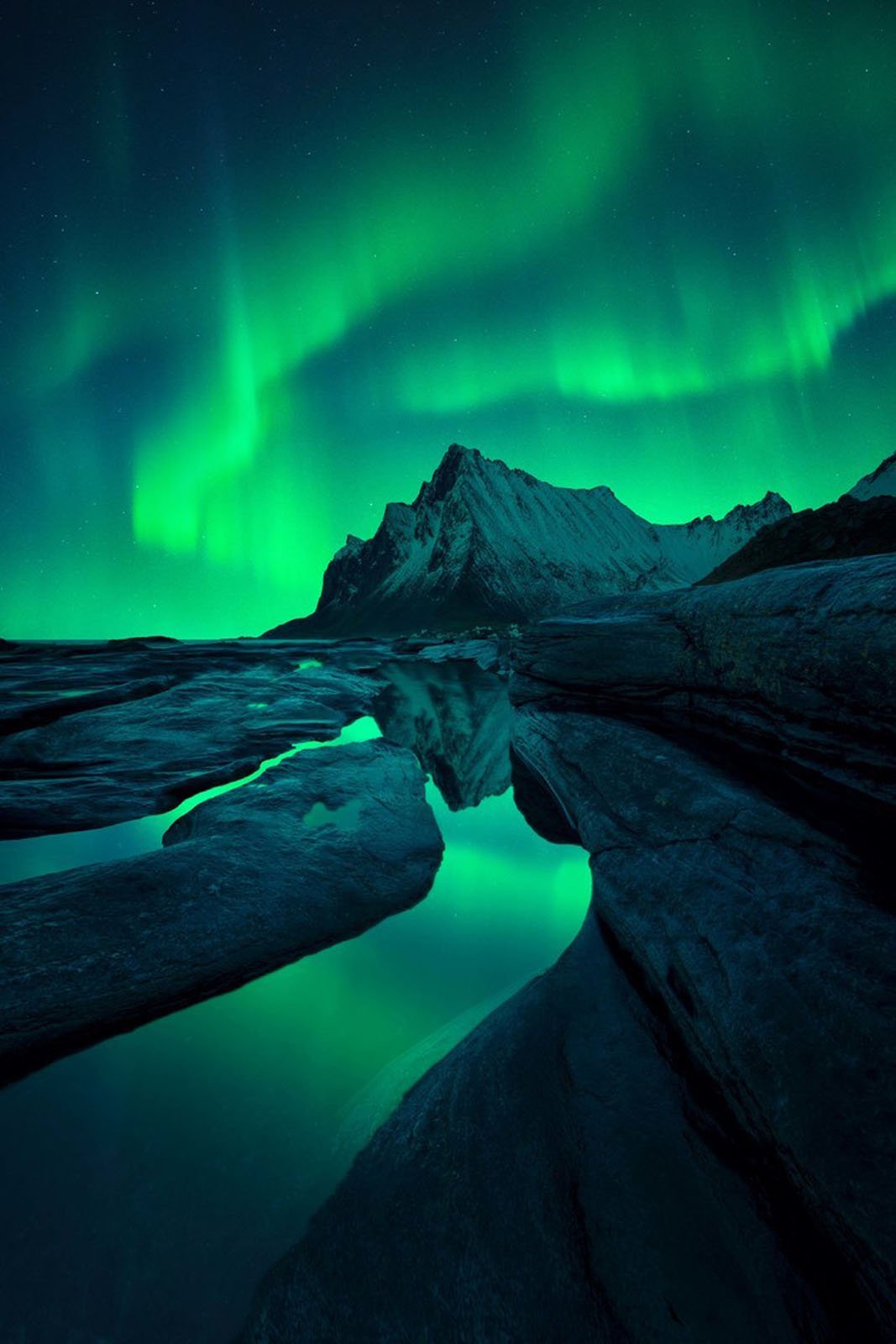
This photo was taken at one of the lesser-known beaches in Lofoten, Norway, called “Vikten.” As with my other shots, I aimed to capture something new and different. During low tide at Vikten beach, numerous small pools emerge in the rocky paths carved by the ocean. So the first crucial step was to wait for the low tide.
Then, I sought the ideal composition with a foreground pool to create a leading-line effect. After a few minutes of searching, I found it! The next challenge was achieving sharpness, which can be challenging in low light conditions. To address this, I needed to focus stack the foreground. I used six individual shots for focus stacking the foreground to ensure everything was sharp.
Following that, I had to wait for the ideal aurora shape to improve my composition. I captured several photos and selected the one in which it formed the ideal shape for my composition. This allowed the aurora itself to become a part of the leading lines, resembling “green snakes”.
‘Aurora Flame’ by Richard Zheng
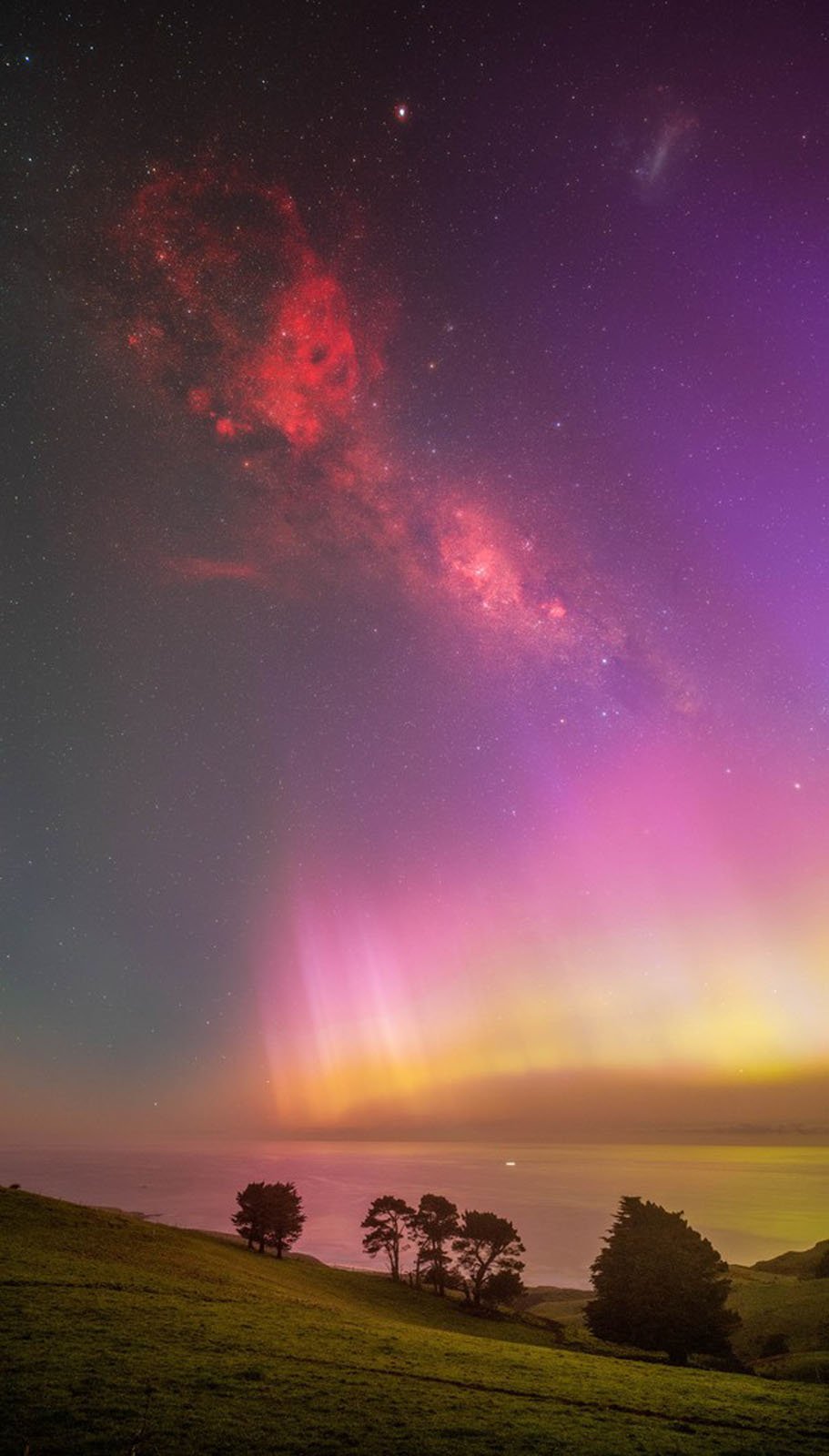
The peninsula of Dunedin in New Zealand is a good place to observe the aurora. It not only has very little light pollution but there are many bays facing South, which is ideal to capture the Aurora Australis. This photo was taken at an lookout on the roadside of Highcliffe.
This was the first time I had the opportunity to take photos of the Aurora and emission nebulae using a special camera for astrophotography.
In this photo, you can see the Large Magellanic Cloud in the upper right corner. The red mass in the upper left corner of the picture is the Colloidal Nebula, and extending down is the Carina Nebula.
‘Kirkjufell Explosion’ by Marc Marco Ripoll
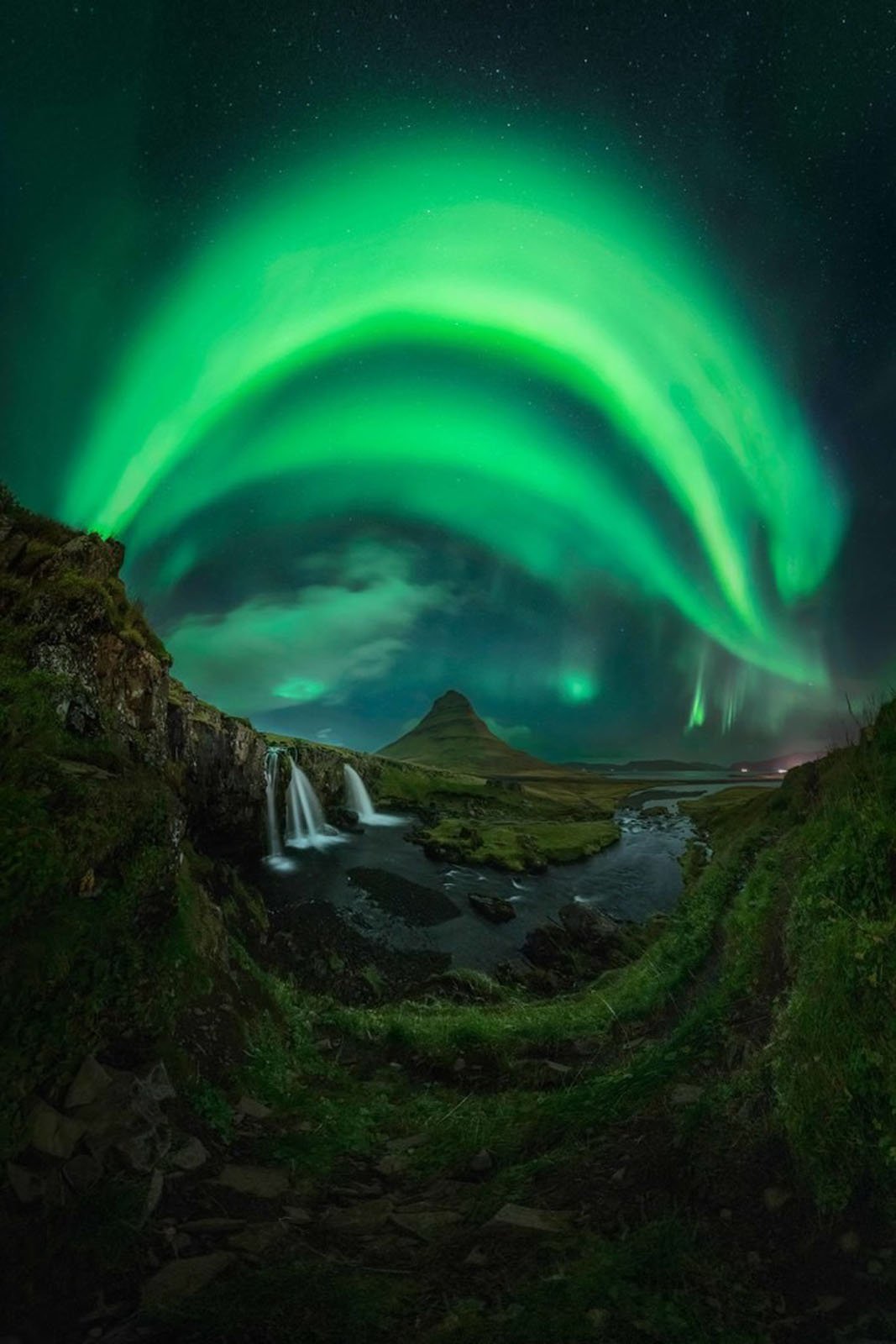
This was our second night in Iceland, and the popular Mt. Kirkjufell was painted in green. With an aurora forecast in place, we stood there at dusk, anticipating the celestial display. As darkness descended, timid auroras emerged on the horizon.
Initially, I framed the classic view of the location, but suddenly, the sky exploded over my head! Faced with this spectacle, I mounted my wide-angle lens, aimed it towards the sky, and started shooting the first row of a panorama. As it wasn’t enough, I went for the second, then the third, and finally the fourth row!
The real challenge came when I tried to stitch it all together at home. Given the considerable movement in the Northern Lights, neither Lightroom nor Photoshop proved effective. In the end, I resorted to using control points in a specific panorama program, and it worked!
Image credits: All photos are individually credited and provided courtesy of Capture the Atlas.
